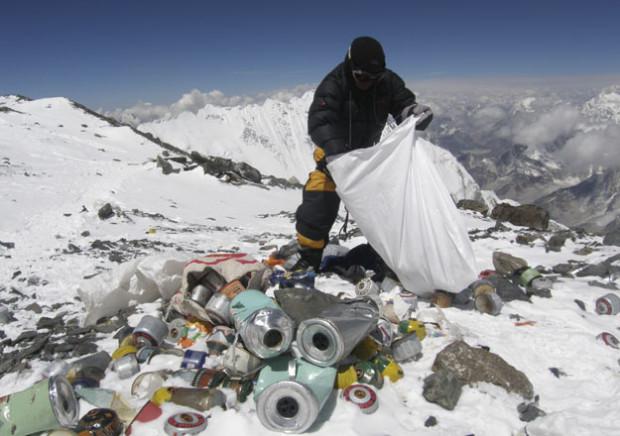588
Nepal introduces a tax on garbage and feces on Everest
A good reason not to climb the highest peak mira
The conquerors of Everest for many decades left on the slopes of the highest mountain in the world garbage and feces. In order to somehow fight this, Nepal this week announced that anyone who wants to express themselves on the deadly slope should pay for it - rubbish, strangely enough.
Although nothing strange: on the glaciers of the debris, at least ten tons. Nepal is trying to clean up the mountain, demanding that every climber has brought its own garbage back, and did not throw on the slopes, and in addition picked up and brought another eight kilograms of others: excrement, discarded cans or corpses - in short, everything that finds during lifting or lowering.
Before starting the journey climbers sent to a base camp at the foot of the mountain, where everything that can be garbage is weighed. The penalty for those who do not fulfill an order, not yet invented, although the Minister of Nepal Tourism Madhusudan Burlakoti promises to "take legal action».

Officially Nepal has always believed that tourists are required to clean up after themselves all the rubbish, which brought with them. Unfortunately, Everest - the place is very aggressive and dangerous, and care for the environment there is quite difficult. Sharply there is a problem of survival if the climbers decide to save the last of his strength and throw the empty gas cylinders on the mountain to survive, can we blame them?
The garbage tax - not the first attempt on Everest in Nepal to clear mud. A team of Nepalese and Indians over the past five years made Everest impressive 13 tons of trash, but about ten tons still remain there. 2, 5 tons of waste are likely to represent a biohazard.
Also on Everest in 50 years left 240 dead. Bring them out is almost impossible - in the rarefied air on the motion expended much more effort. So I do not believe that even the most conscientious climbers will do it.
However, the new law can be at least indirectly affect the climbers - perhaps they will take less than consumables.
via factroom.ru

The conquerors of Everest for many decades left on the slopes of the highest mountain in the world garbage and feces. In order to somehow fight this, Nepal this week announced that anyone who wants to express themselves on the deadly slope should pay for it - rubbish, strangely enough.
Although nothing strange: on the glaciers of the debris, at least ten tons. Nepal is trying to clean up the mountain, demanding that every climber has brought its own garbage back, and did not throw on the slopes, and in addition picked up and brought another eight kilograms of others: excrement, discarded cans or corpses - in short, everything that finds during lifting or lowering.
Before starting the journey climbers sent to a base camp at the foot of the mountain, where everything that can be garbage is weighed. The penalty for those who do not fulfill an order, not yet invented, although the Minister of Nepal Tourism Madhusudan Burlakoti promises to "take legal action».

Officially Nepal has always believed that tourists are required to clean up after themselves all the rubbish, which brought with them. Unfortunately, Everest - the place is very aggressive and dangerous, and care for the environment there is quite difficult. Sharply there is a problem of survival if the climbers decide to save the last of his strength and throw the empty gas cylinders on the mountain to survive, can we blame them?
The garbage tax - not the first attempt on Everest in Nepal to clear mud. A team of Nepalese and Indians over the past five years made Everest impressive 13 tons of trash, but about ten tons still remain there. 2, 5 tons of waste are likely to represent a biohazard.
Also on Everest in 50 years left 240 dead. Bring them out is almost impossible - in the rarefied air on the motion expended much more effort. So I do not believe that even the most conscientious climbers will do it.
However, the new law can be at least indirectly affect the climbers - perhaps they will take less than consumables.
via factroom.ru
Although plants do not have a brain, they are able to count the risks
A woman of 14 years living with the family of dummies























